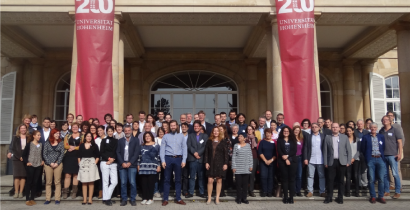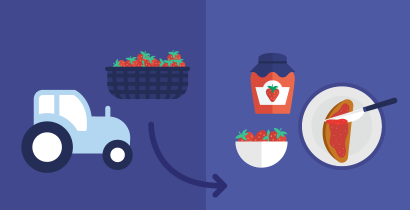SmartChain – smart solutions in short food supply chains
Last Updated : 08 April 2019In recent years, as global food chains have expanded, a large range of terms have been used to illustrate innovative re-organisation of food supply chains aiming at re-connecting producers and consumers, and re-localising agricultural food production. These include short supply chains, among others.
Short food supply chains (SFSCs) involve by definition “a limited number of operators committed to cooperation, local economic development, and close geographical and social relations between food producers, processors and consumers”. They represent an alternative to conventional longer food chains where small farmers or cooperatives often have little bargaining power and the consumer cannot trace the food to a known producer or local area. Their advantages include reducing carbon footprint, contributing to food security at home, giving consumers access to a healthy diet, and sustaining small farms and business.
The current EU rural development policy 2014-2020 puts more emphasis than ever on short food supply chains and continues to support initiatives that help in setting up and developing these food chains. A good example is SMARTCHAIN, an ambitious 3-year project that aims to further unlock the potential of short food supply chains in terms of competitiveness and sustainability, and to promote a more favourable framework for sustainable, local, healthier and ethically produced food in Europe.
To achieve this, 43 project partners from 11 European countries are expected to perform a thorough analysis of different types of short food supply chains (i.e., on-farm direct sales, farmers’ markets, speciality shops, community supported agriculture), pinpoint the key parameters that influence sustainable food production and rural development in the different EU regions, and develop concrete policy and business recommendations. Researchers will work on 18 case studies to understand the different technological, regulatory, social, economic, and environmental factors that play a role in the success of SFSCs. The project will also initiate and strengthen collaboration among different stakeholders through the establishment of 9 innovation and collaboration hubs, innovation workshops and training activities for farmers and short food supply chain entrepreneurs, together with the development of an interactive virtual platform to generate, share and utilise information on practical innovative solutions. The platform strives to bring together an international community of SFSCs through a gamified approach.
SMARTCHAIN is coordinated by the University of Hohenheim and has received funding from the European Union’s Horizon 2020 research and Innovation programme under grant agreement No. 773785. EUFIC’s role in the project is twofold, leading the investigation of food-related consumer behaviours to understand what drives consumers’ choices and purchase decisions across different short food supply chains, and supporting the communications team to raise awareness on the project and spot opportunities for dissemination and exploitation of results, an example of which is SMARTCHAIN coverage on the Project Repository Journal.
For more information, visit https://www.smartchain-h2020.eu or join the twitter hashtag #SMARTCHAIN_EU.
Press contacts:
|
Susanne Braun & Dr. F. Javier Casado Hebrard |
Branwen Miles |


